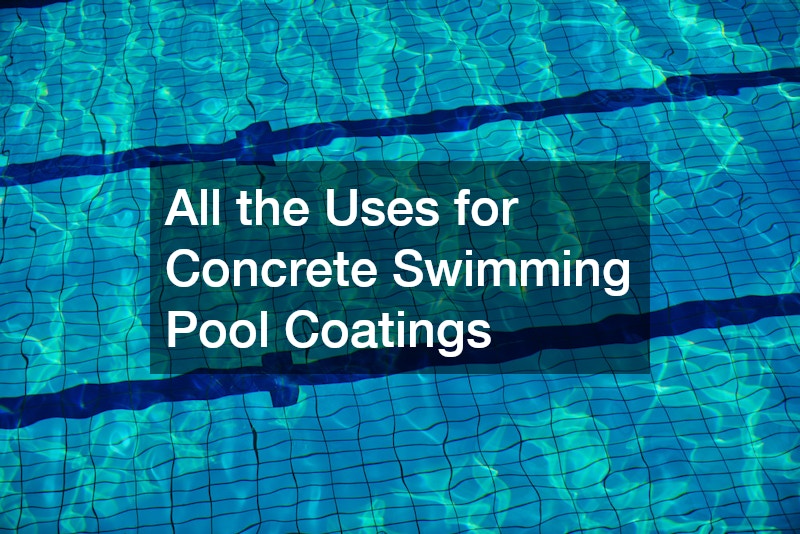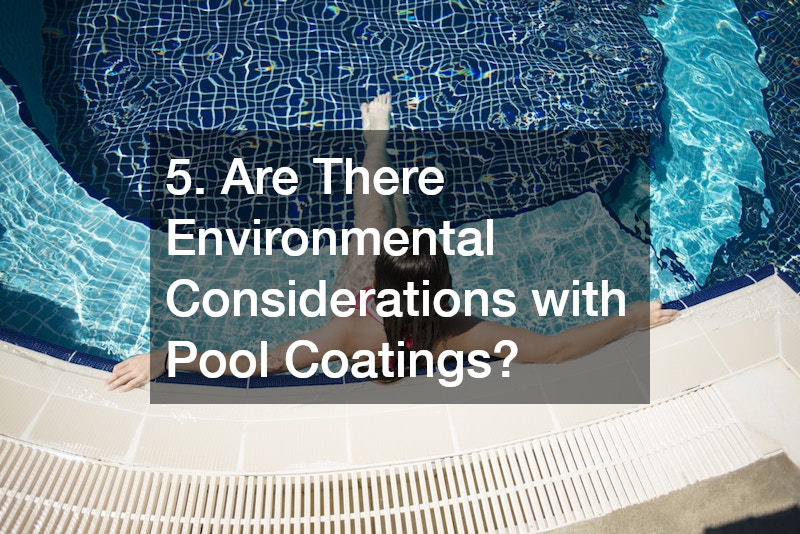

Concrete swimming pool coatings are vital for maintaining and enhancing the longevity and appearance of swimming pools. They offer numerous benefits, transforming both residential and commercial pools while ensuring safety and structural integrity.
1. What Are the Benefits of Using Concrete Pool Coatings?
a. Enhanced Durability and Longevity
Concrete pool coatings protect against common damages such as cracks and aging, effectively prolonging the lifespan of the pool. These coatings form a barrier that resists the impact of wear and tear caused by regular use and environmental factors.
By reinforcing the pool’s surface, coatings help maintain structural integrity, minimizing costly repairs over time. They offer an economical solution by reducing the frequency of repairs and maintenance.
This extended durability means that the initial investment in pool coatings pays off through years of sustained performance. Owners can enjoy their pools without concern over frequent structural issues.
b. Improved Aesthetics
One of the key benefits of concrete pool coatings is the ability to choose from an array of finishes and color options. These choices allow pool owners to customize the look of their pools, achieving a desired aesthetic that complements the surrounding environment.
Whether for a luxurious hotel pool or a private backyard oasis, coatings can drastically improve visual appeal. They transform outdated and worn surfaces into vibrant and inviting spaces.
The enhanced aesthetic appeal serves not only the eye but also adds value to the property, making it more attractive to potential buyers. This integrates both style and investment benefits seamlessly.
2. How Do Concrete Pool Coatings Contribute to Safety?
a. Slip Resistance Features
Slip-resistant coatings are a critical safety feature offered by modern pool coatings. They help prevent accidents around the pool area, which is especially crucial in commercial settings.
These coatings provide a textured surface that enhances grip, thus significantly reducing the risk of falls. This feature is especially important in maintaining a safe environment for children and the elderly.
By reducing slip-related dangers, pool owners can ensure safe enjoyment of the facilities, upholding an essential standard of care. This preventive measure demonstrates a proactive approach to safety management.
b. Chemical Protection
Concrete pool coatings also serve as a defense against harmful pool chemicals, further ensuring the longevity of the pool. These coatings prevent the infiltration of chemicals that could degrade the concrete over time.
The barrier created by the coatings minimizes chemical erosion and protects the pool’s structural integrity from harsh treatments. Therefore, coatings act as armor against the many chemicals used to maintain clean and healthy water.
This chemical resistance not only preserves the pool structure but also reduces maintenance costs related to chemical damage. Investors can conserve resources while maintaining optimal conditions.
3. What Are the Different Types of Concrete Pool Coatings?
a. Epoxy-Based Coatings
Epoxy-based coatings are known for their robustness and resistance to stains and abrasions. They are ideal for high-traffic pools, providing a tough, long-lasting surface.
The benefits of epoxy coatings are their durability and ease of cleaning, making them a preferred choice for commercial settings. This type of coating is well-suited for indoor pools due to its superior chemical resistance.
However, epoxy coatings can be sensitive to UV exposure, tending to yellow over time when exposed to direct sunlight. Thus, they are best applied in shaded areas or indoors.
b. Acrylic Coatings
Acrylic pool coatings offer the advantage of quick drying and a smoother finish, making them suitable for outdoor applications. They are resistant to UV rays, which helps prevent color fading.
These coatings are easy to apply and provide a flexible layer that retains its condition through varying weather conditions. They are cost-effective and ideal for both small and large-scale pool projects.
While acrylic coatings offer great versatility, they can be less durable than epoxy and may require more frequent touch-ups. Despite this, their ease of maintenance makes them a practical choice for many pool owners.
4. How to Maintain and Care for Concrete Pool Coatings?
a. Routine Cleaning Practices
Proper maintenance of pool coatings involves routine cleaning to ensure their long-lasting performance. Regular scrubbing with appropriate cleaning agents helps maintain a pristine appearance and prevents damage.
By establishing a cleaning schedule, owners can prevent the buildup of algae and debris that might compromise the coatings. This simple practice is key in extending the coating’s lifespan and maintaining aesthetic appeal.
Consistent cleaning not only keeps the pool looking inviting but also serves as a preventive measure against more serious issues. It supports the overall health of the pool environment.
b. Periodic Recoating
To maintain optimal protection, periodic recoating of the concrete pool surface is recommended. The frequency of recoating depends on various factors, including usage intensity and environmental exposure.
Recoating restores the protective functions of the original application, refreshing the pool’s surface and prolonging its life. This process is essential for keeping up with wear and tear effectively.
A well-timed recoating can save on costly repairs by addressing potential problems before they become severe. It is a vital maintenance step in ensuring long-term performance and enjoyment of the pool.
5. Are There Environmental Considerations with Pool Coatings?
a. Eco-Friendly Options
With increasing concern over environmental impact, eco-friendly pool coatings have become a significant consideration. These coatings are developed with sustainable materials that minimize ecological footprints.
By selecting environmentally friendly options, pool owners contribute positively to environmental conservation efforts. These coatings reduce emissions and incorporate sustainable practices in their formulation.
b. Waste Management and Disposal
Proper waste management and disposal are crucial when dealing with old coatings and related materials. It’s important to follow recommended practices to avoid environmental damage.
Many regions offer guidelines and services for responsibly disposing of hazardous materials, ensuring they do not end up in landfills. Pool owners should be informed about local disposal protocols to promote safe waste management.
.






